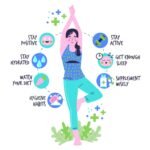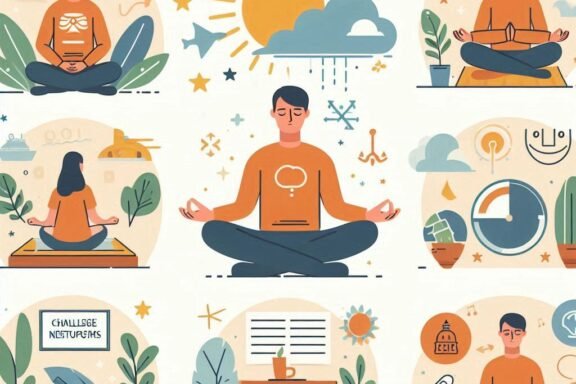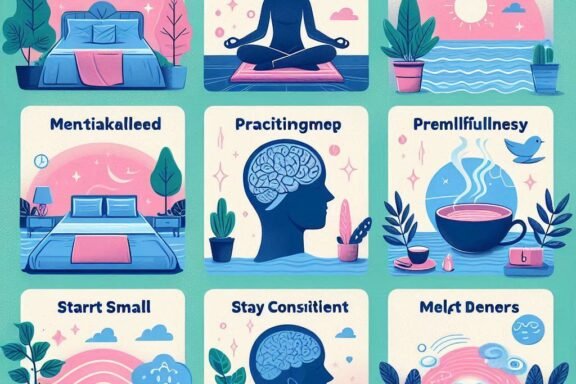Lifestyle, Self-Care, and Anxiety: Creating Balance for a Calmer Mind
In today’s fast-paced world, anxiety has become an all-too-common struggle. The constant pressure to perform at work, the demands of family life, and the stress of trying to meet societal expectations can leave us feeling overwhelmed and mentally drained. Anxiety doesn’t just affect our emotional health; it can take a toll on our physical well-being too, causing sleep disturbances, fatigue, and even digestive issues.
While traditional treatments like therapy and medication are invaluable for managing anxiety, lifestyle choices and self-care practices can play a pivotal role in helping us cope with and reduce the symptoms of anxiety. By making small, consistent changes to our daily habits, we can create a more peaceful, balanced life—one where we can better manage stress and nurture our mental health.
In this blog, we’ll explore how adopting mindful lifestyle choices and prioritizing self-care can significantly reduce anxiety and help you lead a calmer, more centered life.
The Connection Between Lifestyle and Anxiety
Our lifestyle choices, including what we eat, how we sleep, and how we manage stress, have a direct impact on our mental health. When life becomes chaotic and we neglect certain aspects of self-care, anxiety can thrive. On the flip side, when we make intentional changes to our routines and practice mindfulness, we create an environment where our mental health can flourish.
Here are some key lifestyle factors that influence anxiety levels:
1. Sleep and Anxiety: The Power of Rest
Sleep is often one of the first things affected by anxiety. When you’re feeling anxious, it can be difficult to fall asleep, stay asleep, or get restorative sleep. Sleep deprivation, in turn, makes anxiety worse, creating a vicious cycle. Lack of sleep impairs cognitive function, increases irritability, and makes it harder to manage stress.
A good night’s sleep is essential for emotional regulation, memory, and overall mental clarity. Here are some tips to improve your sleep hygiene and reduce anxiety at bedtime:
- Set a consistent sleep schedule: Go to bed and wake up at the same time every day, even on weekends. This helps regulate your body’s internal clock.
- Create a calming bedtime routine: Try activities that promote relaxation, like reading, taking a warm bath, or listening to soothing music.
- Limit screen time before bed: The blue light emitted by phones, tablets, and computers can interfere with melatonin production and disrupt your sleep. Aim to turn off electronic devices at least 30 minutes before bedtime.
By prioritizing quality sleep, you allow your body and mind to rest and rejuvenate, reducing the physical and mental effects of anxiety.
2. Nutrition: Fueling Your Body for Calmness
What we eat can significantly impact our mood and anxiety levels. A diet rich in whole foods, including fruits, vegetables, lean proteins, healthy fats, and whole grains, provides the nutrients necessary for proper brain function and emotional stability. On the other hand, processed foods, high sugar intake, and excessive caffeine can increase anxiety by causing blood sugar fluctuations, inflammation, and the overproduction of stress hormones like cortisol.
Here are some dietary tips to help manage anxiety:
- Eat nutrient-dense meals: Incorporate more omega-3 fatty acids, magnesium, and vitamin-rich foods into your diet. Fatty fish like salmon, leafy greens, nuts, seeds, and whole grains help maintain balanced mood levels and promote relaxation.
- Limit caffeine and alcohol: Both caffeine and alcohol can worsen anxiety by increasing heart rate and disrupting sleep. Try reducing your intake and observe how it affects your anxiety levels.
- Stay hydrated: Dehydration can cause irritability and fatigue, making anxiety harder to manage. Drink plenty of water throughout the day to stay energized and calm.
Your body and brain thrive on a balanced, nutrient-rich diet, which in turn helps reduce the physical symptoms of anxiety, such as tension and restlessness.
The Role of Self-Care in Managing Anxiety
Self-care refers to the practice of taking an active role in protecting one’s own well-being, both mentally and physically. It’s an intentional process of caring for yourself to restore balance, improve mood, and build resilience against stress. When you prioritize self-care, you’re better equipped to manage the demands of life, reduce anxiety, and improve your overall sense of well-being.
1. Mindfulness and Meditation: Calming the Mind
One of the most effective self-care practices for managing anxiety is mindfulness meditation. Mindfulness is the practice of being fully present in the moment, observing your thoughts and feelings without judgment. This practice helps break the cycle of anxious thinking and allows you to respond to stress in a calm, measured way.
Meditation has been shown to reduce the production of stress hormones like cortisol, increase serotonin levels (the “feel-good” neurotransmitter), and promote relaxation.
Here are some ways to incorporate mindfulness into your life:
- Daily meditation practice: Even just 5-10 minutes of meditation each morning can set the tone for a calm day. Focus on your breath or use a guided meditation app to ease into the practice.
- Mindful breathing: When you feel anxiety creeping in, take a few deep, slow breaths. Inhale for a count of four, hold for four, and exhale for four. This simple technique helps activate your parasympathetic nervous system, reducing stress and calming your body.
- Body scan: A body scan is a form of mindfulness meditation where you mentally check in with each part of your body, releasing any tension. This practice can help you become more aware of areas where stress and anxiety manifest in your body, allowing you to release it.
Regular meditation and mindfulness practices not only calm your mind but also train your brain to respond more effectively to anxiety triggers.
2. Exercise: Moving Away from Anxiety
Physical activity is another powerful self-care tool for managing anxiety. Exercise helps release endorphins, the body’s natural “feel-good” chemicals, which can help lift your mood and reduce anxiety. Whether it’s a walk in the park, a yoga session, or a high-intensity workout, movement is a natural remedy for stress.
Here are some ways to incorporate more movement into your daily routine:
- Start with something enjoyable: Choose activities you love, whether it’s dancing, swimming, or hiking. This will help you stay consistent and make exercise feel less like a chore.
- Regular exercise: Aim for at least 30 minutes of moderate activity most days of the week. Even a brisk walk can help reduce feelings of anxiety.
- Practice yoga or tai chi: These mind-body practices focus on deep breathing, relaxation, and gentle movement, which can reduce muscle tension and anxiety levels.
Exercise not only improves your physical health but also releases tension, boosts mood, and helps you manage anxiety more effectively.
3. Time in Nature: A Natural Stress Reliever
Spending time in nature has been shown to have significant benefits for mental health, including reducing anxiety. Natural environments help lower cortisol levels, improve mood, and restore mental clarity. The sights, sounds, and smells of nature have a calming effect on the mind and body, helping you feel more grounded and at peace.
Here are some ways to connect with nature:
- Take regular walks outdoors: A walk in the park or a nature trail can work wonders for calming your mind and reducing anxiety.
- Spend time in green spaces: Research shows that spending time in parks or gardens can reduce symptoms of anxiety and improve overall well-being.
- Disconnect from technology: Spending time in nature allows you to unplug from the digital world, which can help reduce information overload and stress.
Nature is one of the most effective natural remedies for anxiety, offering a peaceful escape from daily pressures.
Conclusion: Creating a Lifestyle that Supports Your Mental Health
Managing anxiety is about more than just reacting to moments of stress—it’s about creating a balanced lifestyle that nurtures your body, mind, and spirit on a daily basis. By adopting mindful self-care practices, prioritizing sleep, eating nutrient-dense foods, and incorporating movement and time in nature into your routine, you can significantly reduce anxiety and cultivate a sense of calm and resilience.
Remember, self-care isn’t selfish—it’s necessary for maintaining good mental health. By taking care of yourself, you build the strength and clarity to handle life’s challenges with greater ease and confidence.
If you’re struggling with anxiety, start small by incorporating one or two of these practices into your daily life. Over time, you’ll create a lifestyle that supports your mental health, helping you find peace in the chaos and calm in the storm.







No Comments